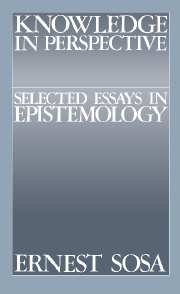Book contents
- Frontmatter
- Contents
- Sources and acknowledgments
- Introduction: back to basics
- PART I WHAT IS KNOWLEDGE, AND HOW IS IT POSSIBLE?
- PART II THEORIES OF JUSTIFICATION
- 5 Epistemology today: a perspective in retrospect
- 6 Nature unmirrored, epistemology naturalized
- 7 Theories of justification: old doctrines newly defended
- 8 Reliabilism and intellectual virtue
- PART III INTELLECTUAL VIRTUE AND EPISTEMIC PERSPECTIVE: A VIEW PRESENTED
- PART IV INTELLECTUAL VIRTUE IN PERSPECTIVE: THE VIEW DEVELOPED
- Index
5 - Epistemology today: a perspective in retrospect
Published online by Cambridge University Press: 08 January 2010
- Frontmatter
- Contents
- Sources and acknowledgments
- Introduction: back to basics
- PART I WHAT IS KNOWLEDGE, AND HOW IS IT POSSIBLE?
- PART II THEORIES OF JUSTIFICATION
- 5 Epistemology today: a perspective in retrospect
- 6 Nature unmirrored, epistemology naturalized
- 7 Theories of justification: old doctrines newly defended
- 8 Reliabilism and intellectual virtue
- PART III INTELLECTUAL VIRTUE AND EPISTEMIC PERSPECTIVE: A VIEW PRESENTED
- PART IV INTELLECTUAL VIRTUE IN PERSPECTIVE: THE VIEW DEVELOPED
- Index
Summary
PHENOMENALISM
According to the main tradition, knowledge is either direct or indirect: direct when it intuits some perfectly obvious fact of introspection or a priori necessity; indirect when based on deductive proof stemming ultimately from intuited premises. Simple and compelling though it is, this Cartesian conception of knowledge must be surmounted to avoid skepticism. Seeing that the straight and narrow of deductive proof leads nowhere, C. I. Lewis wisely opts for a highroad of probabilistic inference. But how can one arrive at a realm inaccessible through direct knowledge having set out from one thus accessible? How could probabilistic inference offer any help? There are two different answers to these questions in Lewis's writings, and he moves from one to the other under pressure of well-known objections from perceptual relativity. Our action divides into three acts, which we now review in turn.
Act One: According to Lewis a statement about one's surroundings, such as P (that there is a sheet of paper before one), has analytic implications for one's experience, these being statements estimating the probability of outcomes for one's experience yielded by various action-cum-experience combinations. Thus our statement P is said by Lewis to have as one of its analytic consequences that if s1 (a visual sheet of paper presentation is given to one) and a1 (one seems to oneself to move one's eyes), then in all probability e1 (a seen displacement of the presentation follows for one).
Information
- Type
- Chapter
- Information
- Knowledge in PerspectiveSelected Essays in Epistemology, pp. 65 - 85Publisher: Cambridge University PressPrint publication year: 1991
